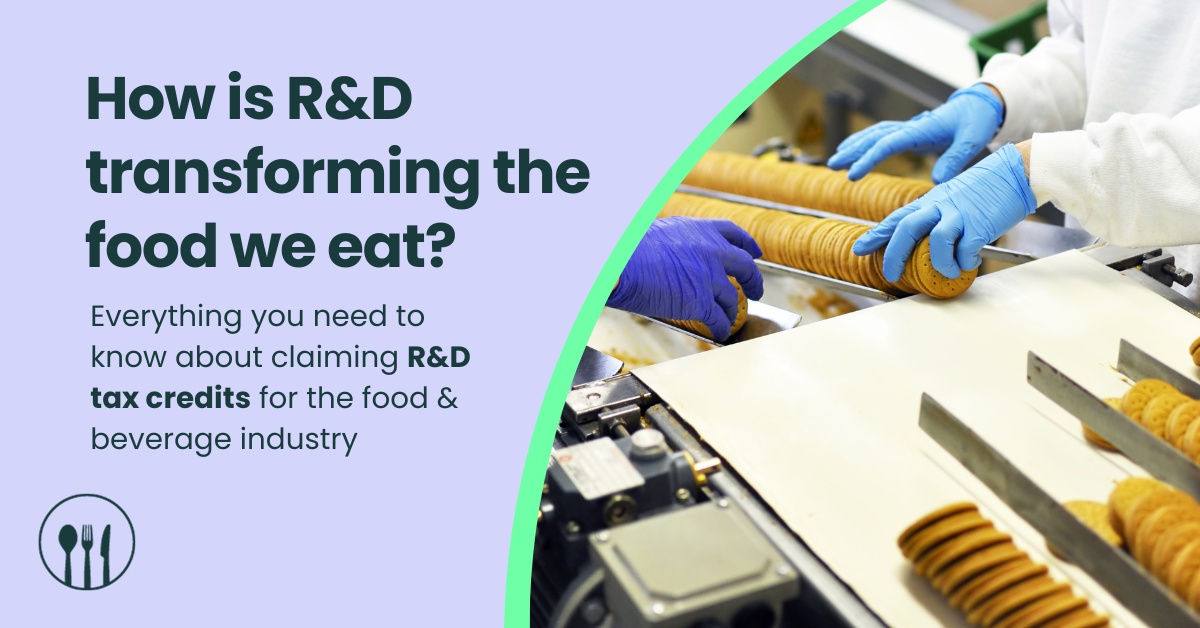Within the ever-evolving realm of the food and beverage industry, Research and Development (R&D) stands as a pivotal force, driving innovation, addressing challenges, and reshaping the landscape of what we consume. Despite this, awareness of the opportunity of R&D tax credits is considerably low for the food and beverage industry compared to manufacturing or IT. This article aims to break down the key role of R&D in the food and beverage industry to highlight the broad scope of eligibility to help more businesses benefit from the incentive. It’s a huge industry, with a compound annual growth rate (CAGR) of 7.3%, meaning there is a huge amount of R&D claims waiting to be completed. We’ll discuss the symbiotic relationship between R&D and evolving consumer trends, emphasising its role in steering the industry towards sustainability, health-conscious alternatives, and diverse culinary experiences.
What is R&D in the food and beverage industry?
Businesses in the UK involved in research and development, both SMEs and large companies, can receive a financial reward for their efforts from the government in the form of R&D tax credits. These credits aim to stimulate economic growth by fostering innovation and supporting companies that push the boundaries of knowledge and technology. This supports businesses to drive their efforts further without being held back by the cost of their R&D endeavours.
In the context of the food and beverage industry, R&D looks at ways to:
- Meet evolving regulations - Innovating processes and products to ensure compliance with stringent regulations, encompassing food safety standards, labelling requirements, and health regulations, while striving for continuous improvement and consumer satisfaction.
- Reduce wastage - Utilising innovative techniques in production, packaging, and preservation, seeking sustainable solutions and efficient processes to extend the shelf-life of products.
- Increase efficiency - Implementing advanced technologies, streamlining production processes, and optimising supply chains to maximise productivity and reduce costs while maintaining quality.
- Reduce costs - Exploring innovative methodologies and technologies to streamline operations, optimise resources, and develop cost-effective processes without compromising product quality or safety.
- Promote eco-friendly practices - Developing and implementing sustainable practices, including eco-friendly packaging, sourcing, and production methods, aiming to minimise environmental impact and foster a more sustainable future.
- Keep up with market trends - Developing new products that align with evolving consumer preferences, nutritional demands, and cultural shifts.
Why is research and development important in the food and drink industry?
Firstly, R&D serves as the cornerstone for innovation, allowing companies to explore new ingredients, production methods, and flavours, ensuring a continuous stream of novel and diverse products that cater to ever-evolving consumer tastes and preferences. R&D also significantly contributes to improving food safety and quality standards by conducting rigorous testing and experiments, ensuring that the products meet regulatory requirements and adhere to the highest safety benchmarks. Additionally, it fosters economic growth by enhancing efficiency in production processes, reducing wastage, and developing cost-effective methods, thereby boosting profitability. Ultimately, R&D is instrumental in not only driving innovation but also in addressing crucial concerns of safety, sustainability, and economic viability within the food and beverage industry.
Without the financial incentive of R&D tax credits, innovative projects would take longer to complete, or even start! R&D stands as the engine that not only propels innovation but also addresses the industry's need to adapt, thrive, and serve the changing needs of a growing and dynamic consumer base.
Why is there a low awareness of R&D for food and beverage innovations?
Unfortunately, lots of food and beverage businesses are missing out on R&D tax credits because of a lack of awareness of the incentive. Often when we think of R&D, we might think of laboratories and construction sites, when in reality it is a lot broader than this. You could have found a new way to prepare plant-based milk or reduced the salt content of pasta sauce. The intricate nature of R&D activities in the food and beverage industry, which might not fit traditional research models, coupled with complex tax laws, makes it challenging for companies to identify eligible expenses. Additionally, the fragmented nature of the industry, with numerous small and medium-sized enterprises, may lack the resources or expertise to navigate the complex application process, leading to underutilisation of R&D tax credits.
Examples of R&D projects in the food and beverage industry
Development of plant-based meat alternatives
Research focused on creating plant-based meat substitutes that closely mimic the taste, texture, and nutritional profile of traditional meat products, using innovative combinations of ingredients and processing techniques.
Enhanced nutritional products
R&D aimed at developing fortified or enriched food and beverage products to enhance their nutritional value, such as fortified cereals with added vitamins and minerals or beverages with added functional benefits.
Smart packaging innovations
Research into smart packaging materials equipped with sensors to extend shelf-life, monitor freshness, or provide information on food safety, contributing to reducing food waste and ensuring product quality.
Novel food preservation methods
Projects focusing on exploring new preservation techniques like high-pressure processing, cold plasma treatment, or natural antimicrobial compounds to extend the shelf life of perishable foods without compromising taste or quality.
Sustainable sourcing and farming techniques
Initiatives geared towards sustainable agricultural practices, such as researching and implementing regenerative farming methods, reducing water usage, or improving crop resilience to climate change, are all aimed at ensuring a more sustainable supply chain.
Advanced automation in food production
R&D efforts to introduce automation and robotics in food production facilities to improve efficiency, reduce labour costs, and enhance food safety by minimising human intervention.
Personalised nutrition solutions
Research on personalised nutrition that tailors food and beverage products to an individual's specific dietary needs or health goals through innovative formulation or customization options.
Waste reduction and upcycling
Projects focused on utilising by-products or food waste to create new products, such as converting food waste into energy, creating new food items, or developing sustainable packaging from biodegradable materials.
These R&D projects represent various facets of innovation and improvement within the food and beverage industry, addressing challenges related to consumer trends, health, sustainability, and operational efficiency.
Key takeaways
Research and Development (R&D) is an indispensable force in the food and beverage industry, yet the low awareness of R&D tax credits remains a significant hurdle. From ensuring compliance and reducing waste to increasing efficiency and aligning with market trends, R&D-eligible projects address safety, sustainability, and economic viability concerns. Enhancing awareness and utilisation of R&D tax credits is crucial for fostering innovation and steering the food and beverage industry towards a more sustainable and consumer-centric future.
How to claim R&D tax credits for the food and beverage industry?
Working with Alexander Clifford as your trusted R&D specialist means the entire claiming process is seamless and aligned with HMRC’s standards to prevent time-consuming enquiries. Our advisors get to know your business and take leadership of your claim to highlight. With an in-depth knowledge of the latest R&D legislation, we ensure no costs are missed out so you receive every penny you’re eligible for. Contact our team to check your eligibility and find out how we can work effectively together.


No comments yet